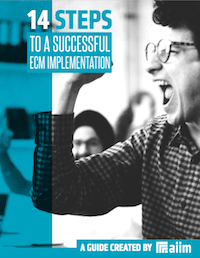The AIIM Blog
Keep your finger on the pulse of Intelligent Information Management with industry news, trends, and best practices.
It's 2020. In the age of ubiquitous information freely available online, why do I choose to spend my time, energy, and hundreds of dollars in membership dues a year to stay involved with associations? At AIIM - the Association for Intelligent Information Management - everything we do is to help you and your organization solve your information-driven business challenges. For me, there are three major reasons that associations hold value. They are: Networking Standardization Personal and Professional Development Let's take a look at each of these in greater detail.
Share
Electronic Records Management (ERM) | Information Security
Only 3 of the worst 10 data breaches of all time happened in 2019, but it was still not a good year for data security. According to CNet, the primary culprit was “unsecured database.” However, one significant contributing factor in many of them was that organizations collected and retained data they generally didn’t need – and if they did, they didn’t need to retain it as long as they had.
Share

Making an ECM implementation successful requires planning and attention to detail. The best way to create the right solution is to identify organizational goals and priorities. Learn how to manage a successful implementation in our free guide.
AIIM on Air | Intelligent Information Management (IIM)
2019 was a great year. We said goodbye to some of our favorite tv shows like Game of Thrones and The Big Bang Theory, cheered as the US Women’s Soccer team won the world cup, and who could forget (insert YOUR favorite 2019 memory here).
Share
Electronic Records Management (ERM)
In a couple of recent blog posts, we’ve talked about important skills every modern records manager must have right now and the best certifications for records managers. This leads to a logical question – how does a records manager get there? Where do you start?
Share
Certified Information Professional (CIP)
The Certified Information Governance Professional (IGP) from ARMA is another certification in the information management field and one that’s attracted a lot of interest from records managers. Although I work for AIIM, which is the sole provider of the CIP certification; I’ve held both certifications since their inaugural beta exams and promise to remain neutral in this unbiased review. We will evaluate the 7 key differences between them, including: Exam Content and Development Exam Price Exam Preparation Exam Experience Digital Badging Certification Maintenance Industry Acceptance
Share
Certified Information Professional (CIP)
Do you want to earn your seat at the table for your organization’s important strategic discussions? Maybe you’re going for that next promotion and looking to round out your skillset. You might even just want to prove to yourself that you have what it takes to be among the industry’s elite. There's a multitude of reasons why you may be interested in the Certified Information Professional certification. No matter the reason, one of the many questions you may have on your mind is how much it costs to get certified. With in-person vs. online testing, an array of options to prepare, and special discounts and free materials for AIIM+ members, it can easily become confusing. At AIIM, we've helped thousands of people get CIP certified. Our goal with this article is to walk you through the costs of this exam so that you can make an informed decision on which is the right path for you.
Share